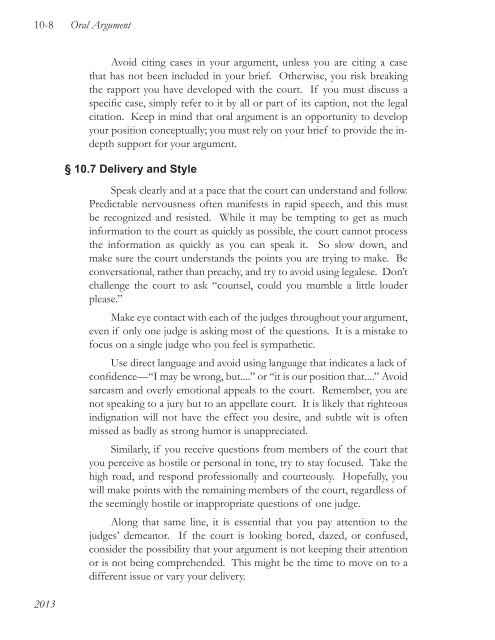You also want an ePaper? Increase the reach of your titles
YUMPU automatically turns print PDFs into web optimized ePapers that Google loves.
10- <strong>Oral</strong> <strong>Argument</strong><br />
2013<br />
Avoid citing cases in your argument, unless you are citing a case<br />
that has not been included in your brief. Otherwise, you risk breaking<br />
the rapport you have developed with the court. If you must discuss a<br />
specific case, simply refer to it by all or part of its caption, not the legal<br />
citation. Keep in mind that oral argument is an opportunity to develop<br />
your position conceptually; you must rely on your brief to provide the indepth<br />
support for your argument.<br />
§ 10.7 Delivery and Style<br />
Speak clearly and at a pace that the court can understand and follow.<br />
Predictable nervousness often manifests in rapid speech, and this must<br />
be recognized and resisted. While it may be tempting to get as much<br />
information to the court as quickly as possible, the court cannot process<br />
the information as quickly as you can speak it. So slow down, and<br />
make sure the court understands the points you are trying to make. Be<br />
conversational, rather than preachy, and try to avoid using legalese. Don’t<br />
challenge the court to ask “counsel, could you mumble a little louder<br />
please.”<br />
Make eye contact with each of the judges throughout your argument,<br />
even if only one judge is asking most of the questions. It is a mistake to<br />
focus on a single judge who you feel is sympathetic.<br />
Use direct language and avoid using language that indicates a lack of<br />
confidence—“I may be wrong, but....” or “it is our position that....” Avoid<br />
sarcasm and overly emotional appeals to the court. Remember, you are<br />
not speaking to a jury but to an appellate court. It is likely that righteous<br />
indignation will not have the effect you desire, and subtle wit is often<br />
missed as badly as strong humor is unappreciated.<br />
Similarly, if you receive questions from members of the court that<br />
you perceive as hostile or personal in tone, try to stay focused. Take the<br />
high road, and respond professionally and courteously. Hopefully, you<br />
will make points with the remaining members of the court, regardless of<br />
the seemingly hostile or inappropriate questions of one judge.<br />
Along that same line, it is essential that you pay attention to the<br />
judges’ demeanor. If the court is looking bored, dazed, or confused,<br />
consider the possibility that your argument is not keeping their attention<br />
or is not being comprehended. This might be the time to move on to a<br />
different issue or vary your delivery.

















